Coffee enthusiasts and casual drinkers alike are increasingly turning to single origin organic coffee beans for their daily brew. These specialty coffees offer a unique taste experience, traceability, and environmental benefits that mass-produced blends simply can’t match.
After extensive research and tasting, we’ve identified five standout options that showcase the best single origin and organic coffee has to offer.
PureCoffeeCraft is a participant in the Amazon Services LLC Associate Program, an affiliate advertising program designed to provide a means for sites to earn advertising fees by advertising and linking to Amazon. There is no extra cost to consumers for clicking on the following links.
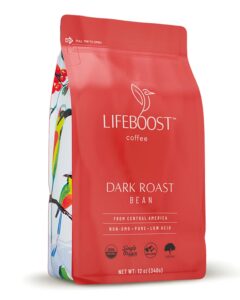
Lifeboost Dark Roast Coffee stands out as a premium choice for those who prefer a bold, rich flavor profile. Sourced from the mountains of Nicaragua, this USDA-certified organic coffee is shade-grown, which contributes to it’s exceptional taste and supports sustainable farming practices.
The dark roast brings out a smooth, low-acid profile that’s perfect for people who have sensitive stomachs or who simply prefer a less acidic cup.
The chocolatey notes are prominent, making it an excellent choice for those who enjoy their coffee with a hint of indulgence.
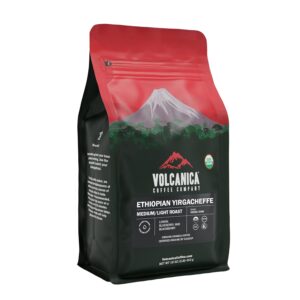
For those seeking a brighter, more complex flavor profile, Volcanica Organic Ethiopian Yirgacheffe Coffee is a stellar option. This medium roast coffee hails from the renowned Yirgacheffe region of Ethiopia, widely considered the birthplace of coffee.
The Fair Trade certification confirms that farmers receive fair compensation for their work.
Flavor-wise, this coffee is a revelation, offering a bright acidity that’s balanced by sweet notes of caramel, cocoa, and raw sugar. It’s an excellent choice for pour-over or drip brewing methods that can highlight it’s nuanced flavors.
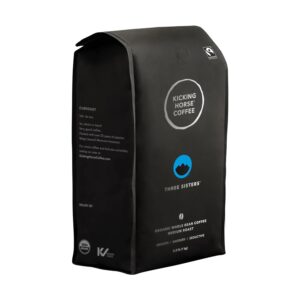
Kicking Horse Coffee’s Three Sisters Blend offers a unique twist on the single origin concept. While not strictly single origin, this blend combines light, medium, and dark roasted beans from Indonesia, South America, and Central America. The result is a complex and well-balanced cup that showcases the best of each region.
With flavors of cocoa, stone fruit, and sweet tobacco, it’s a versatile coffee that can satisfy a wide range of palates.
It’s Fair Trade certification also confirms ethical sourcing practices.
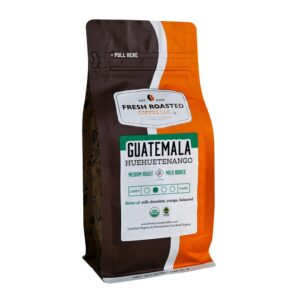
Fresh Roasted Coffee’s Organic Guatemalan Huehuetenango is a testament to the quality of Central American coffee. Sourced from the Huehuetenango region of Guatemala, known for it’s high-altitude growing conditions, this medium roast coffee offers a well-balanced flavor profile.
The USDA organic certification guarantees that no synthetic pesticides or fertilizers were used in it’s production.
Tasting notes of milk chocolate, nuts, and lemon create a harmonious cup that’s both comforting and intriguing.
Rounding out our selection is Gobena Organic Mexican Chiapas Coffee. This offering from the Chiapas region of Mexico is both USDA organic and Fair Trade certified, reflecting a commitment to both environmental sustainability and ethical business practices.
The flavor profile is smooth and well-balanced, medium roast with prominent notes of brown sugar and pear.
It’s an excellent everyday coffee that can be enjoyed black or with milk.
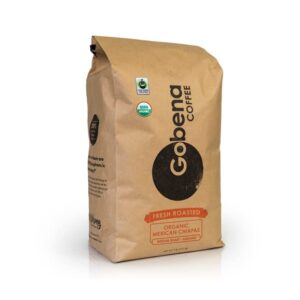
To help you compare these options at a glance, here’s a table summarizing their key features:
| Coffee | Origin | Roast | Key Flavors | Certifications |
|---|---|---|---|---|
| Lifeboost Dark Roast | Nicaragua | Dark | Chocolate | USDA Organic |
| Volcanica Ethiopian Yirgacheffe | Ethiopia | Medium | Caramel, Cocoa, Raw Sugar | Fair Trade, Organic |
| Kicking Horse Three Sisters | Blend (Indonesia, South/Central America) | Mixed | Cocoa, Stone Fruit, Tobacco | Fair Trade |
| Fresh Roasted Guatemalan | Guatemala | Medium | Milk Chocolate, Nuts, Lemon | USDA Organic |
| Gobena Mexican Chiapas | Mexico | Medium | Brown sugar, pear | USDA Organic, Fair Trade |
When choosing a single origin organic coffee, consider your preferred flavor profile and brewing method. Dark roasts like Lifeboost’s offering are excellent for espresso or French press, while medium roasts like the Ethiopian Yirgacheffe shine in pour-over or drip methods.

The Guatemalan and Mexican options offer versatility, performing well across various brewing techniques.
It’s worth noting that single origin coffees can vary slightly from batch to batch because of seasonal changes and small-scale production. This variability is part of their charm, offering coffee lovers the opportunity to experience the subtle nuances that make each harvest unique.
Price is another factor to consider. Single origin organic coffees often command a premium price because of their quality, traceability, and sustainable farming practices.
However, many coffee enthusiasts find the extra cost justified by the superior taste and ethical considerations.
Freshness is crucial when it comes to coffee, especially with single origin beans. Keep the beans in an airtight container away from light, heat, and moisture.
Avoid storing them in the refrigerator or freezer, as this can introduce unwanted moisture and odors.
Single origin organic coffee beans offer a world of flavor and ethical consumption. Whether you prefer the bold chocolatey notes of Nicaraguan beans, the bright complexity of Ethiopian coffee, or the balanced profiles of Central American offerings, there’s a single origin organic coffee to suit every palate.
By choosing these coffees, you’re treating yourself to an exceptional cup and supporting sustainable farming practices and fair compensation for coffee growers around the world.
Sustainability and Ethics
Beyond the taste experience, many users of single origin organic coffee beans appreciate the ethical and environmental aspects of their choice. Knowing that their purchase supports sustainable farming practices and fair compensation for growers adds an extra layer of satisfaction to each cup.
Some coffee drinkers report feeling a deeper connection to the global coffee community when they can trace their beans back to specific farms or cooperatives. This traceability often leads to a greater appreciation for the hard work and skill that goes into producing each batch of beans.
People Also Asked
What’s the difference between single origin and blend coffee?
Single origin coffee comes from one specific region or farm, showcasing it’s unique flavors, while blends mix beans from multiple sources to create a consistent taste profile.
Are single origin organic coffee beans more expensive?
Generally, yes. The specialized growing, processing, and certification requirements often result in higher prices, but many consumers find the quality justifies the cost.
How should I store single origin organic coffee beans?
Store them in an airtight container in a cool, dark place. Avoid refrigeration or freezing, as this can introduce moisture and affect flavor.
Can I use single origin organic coffee beans in my regular coffee maker?
Absolutely. While some brewing methods may better highlight certain characteristics, these beans can be used in any coffee maker for a superior cup.